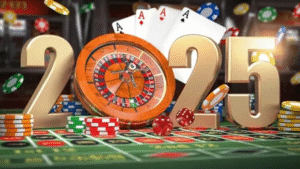
Psychology of Gambling is as much a mental game as it is a game of chance. Whether you’re playing poker, slots, or any other casino game, your mindset and emotional state play a crucial role in your success. The thrill of winning and the frustration of losing can lead to impulsive decisions, which is why discipline is one of the most important skills a gambler can develop.
In this guide, we’ll explore the psychology of gambling and provide actionable tips to help you stay disciplined while playing poker and slots. By understanding the mental aspects of gambling, you can make better decisions, manage your bankroll effectively, and enjoy a more rewarding gaming experience.
The Psychology of Gambling
Gambling triggers a range of psychological responses, many of which can influence your behavior. Here are some key psychological factors to be aware of:
1. The Gambler’s Fallacy
- What It Is: The belief that past events affect future outcomes in games of chance. For example, thinking that a slot machine is “due” for a win after a losing streak.
- Why It’s Dangerous: This fallacy can lead to poor decisions, such as chasing losses or over-betting.
2. The Illusion of Control
- What It Is: The belief that you can influence the outcome of a game through skill or strategy, even when it’s purely based on chance.
- Why It’s Dangerous: This can lead to overconfidence and risky bets, especially in games like slots.
3. The Near-Miss Effect
- What It Is: The feeling that you were close to winning (e.g., two out of three jackpot symbols) and should try again.
- Why It’s Dangerous: Near-misses can keep you playing longer than intended, leading to bigger losses.
4. The High of Winning
- What It Is: The euphoria and adrenaline rush that come with a big win.
- Why It’s Dangerous: This can lead to overconfidence and reckless betting as you chase the next high.
5. The Tilt Effect
- What It Is: A state of emotional frustration that leads to poor decision-making, often after a loss or bad beat.
- Why It’s Dangerous: Tilt can cause you to deviate from your strategy and make impulsive bets.
How to Stay Disciplined in Poker
Poker is a game of skill and strategy, but it also requires strong mental discipline. Here are some tips to help you stay focused and make better decisions:
1. Set Clear Goals
- Before you start playing, define your goals. Are you playing for fun, to improve your skills, or to win money? Having clear goals will help you stay focused.
2. Manage Your Bankroll
- Set a budget for each session and stick to it. Avoid chasing losses or playing at stakes that are too high for your bankroll.
3. Stick to Your Strategy
- Develop a solid poker strategy and stick to it, even when emotions are running high. Avoid making impulsive decisions based on frustration or overconfidence.
4. Take Breaks
- If you’re on a losing streak or feeling frustrated, take a break. Stepping away from the table can help you regain focus and avoid tilt.
5. Review Your Play
- After each session, review your hands and decisions. Identify any mistakes and learn from them to improve your game.
6. Stay Calm Under Pressure
- Poker can be stressful, especially during high-stakes hands. Practice staying calm and making rational decisions, even in tense situations.
How to Stay Disciplined in Slots
Slots are games of chance, but discipline is still crucial to managing your bankroll and maximizing your enjoyment. Here’s how to stay disciplined while playing slots:
1. Set a Budget
- Decide how much you’re willing to spend before you start playing. Once you reach your limit, walk away.
2. Use Betting Limits
- Many online slots allow you to set betting limits. Use this feature to control your spending and avoid overspending.
3. Take Advantage of Bonuses
- Use casino bonuses like free spins or deposit matches to extend your playtime without risking your own money.
4. Avoid Chasing Losses
- If you’re on a losing streak, resist the urge to chase losses by increasing your bets. Stick to your budget and strategy.
5. Play for Fun
- Remember that slots are a form of entertainment, not a way to make money. Focus on enjoying the game rather than winning big.
6. Know When to Walk Away
- Set a win limit and a loss limit. If you hit either limit, stop playing and cash out.
General Tips for Staying Disciplined
Here are some additional tips to help you stay disciplined in any gambling activity:
1. Practice Self-Awareness
- Be aware of your emotions and how they affect your decisions. If you’re feeling frustrated, anxious, or overconfident, take a step back.
2. Set Time Limits
- Decide how long you’ll play before you start. Setting a time limit can help you avoid spending too much time and money.
3. Avoid Alcohol and Drugs
- Psychology of Gambling under the influence can impair your judgment and lead to poor decisions. Stay sober to maintain control.
4. Use Tools and Resources
- Many online casinos offer tools like self-exclusion, deposit limits, and reality checks to help you stay in control.
5. Seek Support if Needed
- If you’re struggling to stay disciplined or feel that gambling is becoming a problem, seek help from organizations like Gamblers Anonymous or a mental health professional.
Conclusion
The Psychology of Gambling plays a significant role in your success and enjoyment. By understanding the mental traps and developing strong discipline, you can make better decisions, manage your bankroll effectively, and have a more rewarding experience. Whether you’re playing poker or slots, staying disciplined is the key to long-term success.
For more tips and resources on responsible gambling, check out these high-authority links:
- Gamblers Anonymous – A support network for individuals struggling with gambling addiction.
- National Council on Problem Gambling – Resources and tools for responsible gambling.
Remember, gambling should be fun and entertaining. Play responsibly, and may the odds be ever in your favor!






